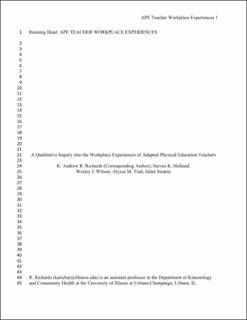| dc.description.abstract | While much is known about the lived experiences of physical education teachers and individuals preparing for careers in physical education, there is a dearth of research on how adapted physical educators are socialized into and through their careers. While physical educators and adapted physical educators have similar goals, such as a general focus on teaching physical skills, they also have different roles and responsibilities as adapted physical educators work specifically with children with a range of cognitive, physical, and emotional disabilities. The purpose of this qualitative, phenomenological study was to develop an in-depth understanding of the workplace experiences itinerant adapted physical education teachers. Participants included 31 itinerant adapted physical education teachers (22 female, 9 male) who were purposively selected from among 273 teachers who completed the initial quantitative survey. Data were collected through in-depth, semi-structured interviews. Two members of the research team analyzed the interview data using a multiphase qualitative analysis procedure grounded in inductive and deductive analysis. Qualitative data analysis indicated that relationships with key stakeholders (e.g. colleagues, administrators, parents, students) were essential to the development of a coordinated, effective system of support for students receiving adapted physical education services. Nevertheless, the itinerant adapted physical educators in this study struggled to develop deep, supportive relationships with colleagues, administrators, and students across schools. relationships with key stakeholders (e.g. colleagues, administrators, parents, students) were essential to the development of a coordinated, effective system of support for students receiving adapted physical education services. Specifically, analysis resulted in the construction of three themes: (a) adapted physical educators rely on an unpredictable support system, (b) support for APE requires targeted relationship development, and (c) relationship building and knowledge of the field aids advocacy efforts. Implications are discussed and recommendations for future research and teacher development are provided. | en_US |
